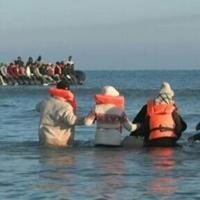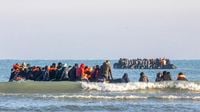In the predawn hours of September 27, 2025, the English Channel bore grim witness to another tragedy in the ongoing migrant crisis. Two Somali women lost their lives while attempting the perilous crossing from France to the United Kingdom, French authorities confirmed. The incident unfolded off the coast of Neufchâtel-Hardelot, south of Boulogne-sur-Mer, as about 100 migrants crowded onto a makeshift boat in hopes of reaching British shores.
According to AFP and corroborated by multiple French media outlets, the overloaded vessel set off around 3:15 am but quickly ran into trouble. Within an hour, the boat had drifted back toward the French coast, unable to start its engine. As chaos erupted, many migrants ended up in the chilly waters, while others were crushed or suffocated in the packed boat. Local Mayor Paulette Juilien-Peuvion recounted to The Sun, "Two women died, and some sixty others were rescued. What could have happened, I don’t know. I was called during the night to be told that a boat had left and that people were in the water."
Rescue operations mobilized swiftly. Over 60 migrants were pulled from the sea and brought ashore. Among the survivors were a couple and their child, all suffering from moderate hypothermia. They were rushed to a hospital in Boulogne-sur-Mer for treatment, as confirmed by local officials. Others, according to the Pas-de-Calais prefecture and La Voix Du Nord, dispersed before emergency services could reach them, highlighting the chaotic and desperate nature of these crossings.
The two victims, identified as adult Somali women by Boulogne-sur-Mer public prosecutor Cécile Gressier in a statement to AFP, were found in cardiac arrest. Despite attempts at resuscitation, they could not be saved. French prosecutors have since opened a formal investigation to determine the precise circumstances of their deaths and to track down the people smugglers believed responsible for launching the ill-fated boat. One police officer at the scene told The Sun, "An investigation has been launched – the remains of the boat are being examined. Neither of the deceased has yet been identified. Plenty of people ended up in the sea, but others were crushed before it went down."
This most recent tragedy brings the number of migrant deaths in the Channel in 2025 to at least 25, according to a tally from official data reported by AFP and The Telegraph. The scale of the crisis is stark: since January, a record 32,000 migrants have arrived in Britain by crossing the Channel in small boats, shattering previous records since systematic data collection began in 2018. The year 2024 saw 78 deaths, the highest since the crossings became a regular occurrence, and the November 2021 disaster, when 27 migrants died after a dinghy sank, remains the deadliest single incident on record.
The dangers of the journey have done little to deter those desperate for a new life. In makeshift camps dotting northern France, migrants wait for favorable weather and an opportunity to board smugglers’ boats. As AFP reported from the Loon-Plage camp near Dunkirk, one Palestinian migrant named Saad summed up the impossible choices facing many: "If I stay here, I am dead. And if I go back home, I am dead." Such sentiments are echoed by countless others who have endured hardship and danger to reach the edge of Europe, only to face the treacherous waters of the Channel.
The mounting death toll has fueled renewed political debate and international tension. French Interior Minister Bruno Retailleau vowed to intensify efforts against the criminal networks that profit from organizing these crossings. "Our government will intensify the fight against these mafias who are getting rich by organising these crossings of death," Retailleau stated, as quoted by The Sun. French and British authorities have faced growing criticism for failing to stem the tide of crossings or to provide safer, legal alternatives for asylum seekers.
In response, the two countries have implemented a new Franco-British scheme aimed at managing the flow of migrants and deterring dangerous crossings. Under the agreement, the UK can return migrants deemed ineligible for asylum—such as those who have passed through a "safe country"—and in return, Britain will accept an equal number of vetted asylum seekers from France. The policy, sometimes referred to as the "one-in-one-out" plan, was put into action earlier this month when a family of three became the first group sent to the UK by France under the new arrangement. Four others who arrived in Britain by boat were recently flown back to France, according to the Pas-de-Calais prefecture and the UK Home Office, which described these moves as "critical first steps."
However, the practical impact of the policy remains uncertain. Despite the new rules, record numbers of migrants continue to risk the crossing. Critics from across the political spectrum have voiced frustration. Prime Minister Keir Starmer and French President Emmanuel Macron have both pledged to "strengthen cooperation" in the fight against people smugglers, but opposition parties and advocacy groups argue that more must be done to address the root causes of migration and to ensure humane treatment for those seeking refuge. Reform UK, for instance, has lambasted the government for failing to reduce overall migration numbers, linking the recent surge to post-Brexit policy changes.
Meanwhile, the social and demographic ripple effects of migration are being felt throughout the UK. Recent figures cited by The Sun revealed that the UK population grew by 750,000 in the year to June 2024, driven almost entirely by international migration. The debate over legal and illegal migration has become a flashpoint in British politics, with calls for both stricter enforcement and greater compassion for vulnerable migrants.
The grim reality is that, for many, the Channel remains both a barrier and a beacon of hope. Smugglers continue to exploit the desperation of those fleeing conflict, poverty, and persecution, while governments on both sides of the water struggle to find effective, humane solutions. As the Boulogne-sur-Mer prosecutor’s investigation continues and the families of the deceased await answers, the tragedy off Neufchâtel-Hardelot stands as a stark reminder of the human cost of the crisis—a cost measured not just in numbers, but in lives lost and futures dashed.
As the Channel’s waters calm and the headlines fade, the underlying issues persist. The search for safety, dignity, and a better life propels thousands to risk everything, even as the odds grow ever more daunting. The question of how to balance border control, humanitarian responsibility, and international cooperation remains unresolved, but the urgency of finding answers has never been clearer.



